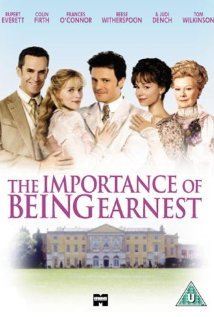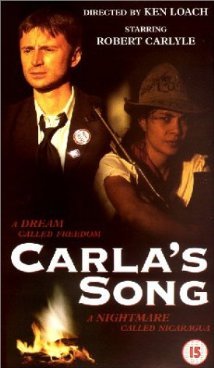“Socialist Propagand”

| None | Light | Moderate | Heavy | |
|---|---|---|---|---|
| Language | ||||
| Violence | ||||
| Sex | ||||
| Nudity |
What You Need To Know:
CARLA’S SONG opens in Scotland in 1987, where a bus driver named George, played by Robert Carlyle of THE FULL MONTY, becomes so intrigued with a young Nicaraguan girl named Carla, played by Oyanka Cabezas that he follows her to her homeland. While there, he learns that the American-backed Contra rebels are allegedly oppressing the people, who stand united against the invaders. He also learns that his lover has a baby with another man who has been tortured by the Contras.
The continual use of foul language in CARLA’S SONG is unnecessary and gratuitous. Although the war scenes are mild, especially compared to other R-rated movies, critically acclaimed director Ken Loach takes a propagandistic, politically-correct, leftist view toward the American-supported Contras and the Latino citizens they allegedly oppress. Nicaragua reportedly remains an extremely poor Central American country, despite the defeat of the totalitarian communist Sandinista government, which confiscated property, nationalized businesses, censured the press, and threw priests from churches. All of which perhaps goes to show that it is not political solutions that make a nation great, or improve the lot of the poor, but religious and moral solutions based on the Gospel of Jesus Christ and the moral principles of the Bible
Content:
(H, Ro, PC, So, LLL, VV, S, M) Humanist worldview with romantic elements & politically-correct, vaguely socialist view of a semi-rural Central American country; 108 obscenities & 11 profanities; mild war violence with gunfire & explosions & a nightmare about torture; implied fornication before marriage but no bedroom scenes; and, miscellaneous immorality such as attempted suicide & alleged political oppression.
More Detail:
Winner of the Special Jury Prize at the Venice Film Festival, Ken Loach’s CARLA’S SONG is a love story depicted amidst the political turmoil of Nicaragua’s social struggles during the 1980s. The movie takes a vague but strong stand in favor of the socialist regime of the Sandinista government and against the American-financed Contras so many discerning viewers may be upset about the movie’s political stance as well as its barrage of obscenities.
The story opens in Scotland in 1987, where a bus driver named George, played by Robert Carlyle of THE FULL MONTY, becomes intrigued with a young girl named Carla, played by Oyanka Cabezas. Carla rides George’s bus one day. When the police detain her because she doesn’t have enough money to buy a ticket, George sticks up for Carla, helping her to escape. Days later, Carla brings a little present to thank him for his help. George tries to converse with her, but she hurriedly takes off. Discovering that Carla is living in a rundown shelter, George tries to help her, but the authorities throw her out because men are not allowed in the shelter.
Desperately, Carla takes George up on his offer to have her stay in an extra room at his friend’s apartment. Slowly, she begins to trust him, seeing that he really cares for her. She tells him she is from Nicaragua, where her family still live. She tells him that she wonders whether her boyfriend there, Antonio, is still alive. When George asks more questions, Carla claims she does not remember what happened. Soon, the couple begin a romantic, and sexual, relationship.
After George discovers some scars on Carla’s back, she attempts suicide. A doctors thinks she is suffering from post-traumatic stress syndrome, speculating she experienced some horrific events in her homeland. Carla starts having nightmares about the last time she saw Antonio, when some soldiers tortured him but she escaped.
Realizing that Carla is haunted by her past, George takes Carla back to war-torn Nicaragua to look for Antonio. While there, George witnesses houses blown up and families destroyed. Through Bradley, a friend of Carla’s and a member of an American human rights organization played by Scott Glenn, George is told about America’s support for the Contras. Bradley admits that he was part of that operation but is now trying to make up for all the “terrible” things in which he took part. George also learns that Carla has a baby and Antonio is the father.
In the deceptive, revisionist world of CARLA’S SONG which has no resemblance to the truth, the Nicaraguan people are totally united against the American-supported Contras and, therefore, are standing up for their country. The movie presents this world in an powerful, propagandistic docudrama style.
The love story between Carla and George is even less believable. George is immediately intrigued by her at first sight and goes to great lengths to pursue her, even though he knows nothing about her. He then breaks off his engagement to his fiancée to go with Carla to Nicaragua. A stronger development of their relationship would help the audience identify more with this couple and their future together.
Carlyle does a great job as the spontaneous and humorous George. He can’t make up, however, for some of the overacting by Cabezas as Carla and Glenn as Bradley. This lends an unnatural aspect to the proceedings.
The continual use of foul language in CARLA’S SONG is unnecessary and, thus, gratuitous. Although the war scenes are mild, especially compared to other R-rated movies, critically acclaimed director Ken Loach takes the politically-correct, loony-leftist view toward the American-supported Contras and the Latino citizens they allegedly oppress.
Regrettably, Nicaragua reportedly remains an extremely poor Central American country, despite the defeat of the totalitarian socialist Sandinista government, which confiscated property, nationalized businesses, censured the press, threw priests from churches, and indulged in rampant debauchery. All of which perhaps goes to show that it is not political solutions that make a nation great, or improve the lot of the poor, but religious and moral solutions based on the Gospel of Jesus Christ and the moral principles of the Bible. God’s Word strongly opposes exploitation of the poor by the rich (see the Book of James), but it also opposes showing favoritism to either the poor or the rich: “Do not pervert justice; do not show partiality to the poor or favoritism to the great, but judge your neighbor fairly (Leviticus 19:15).”


 - Content:
- Content: 

